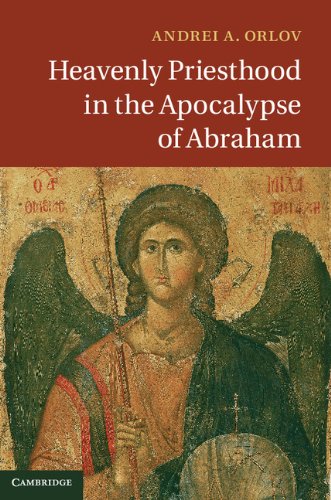I am very excited about this forthcoming book from my former academic advisor Andrei Orlov of Marquette University:

Andrei A. Orlov
Heavenly Priesthood in the Apocalypse of Abraham
Hardcover: 288 pages
Publisher: Cambridge University Press (31 July 2013)
ISBN-10: 110703907X
ISBN-13: 978-1107039070
The Apocalypse of Abraham is a vital source for understanding both Jewish apocalypticism and mysticism. Written anonymously soon after the destruction of the Second Jerusalem Temple, the text envisions heaven as the true place of worship and depicts Abraham as an initiate of celestial priesthood. Andrei A. Orlov focuses on the central rite of the Abraham story – the scapegoat ritual that receives a striking eschatological reinterpretation in the text. He demonstrates that the development of the sacerdotal traditions in the Apocalypse of Abraham, along with a cluster of Jewish mystical motifs, represents an important transition from Jewish apocalypticism to the symbols of early Jewish mysticism. In this way, Orlov offers unique insight into the complex world of the Jewish sacerdotal debates in the early centuries of the Common Era. The book will be of interest to scholars of early Judaism and Christianity, Old Testament studies, and Jewish mysticism and magic.
————————————————–
Table of Contents:
Preface
Introduction
Part I. Sanctuaries:
1. The anthropomorphism of the earthly temple: the idols of Terah’s family
2. The aniconism of the celestial temple: the abode of the divine voice
3. The corporealism of the demonic temple: the Kavod of Azazel
Part II. Rituals:
4. The priestly settings of the text: the Yom Kippur ceremony
5. The transformation of the celebrants
6. The mysteries of the throne room
Conclusion
You can pre-order it here:
http://www.amazon.co.uk/Heavenly-Priesthood-Apocalypse-Abraham-Andrei/dp/110703907X
_
Continue reading at the original source →



